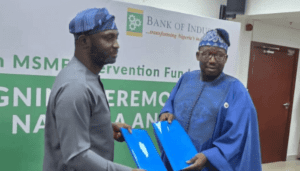NDDC to partner with UN Agency on flood control in Niger Delta
The Niger Delta Development Commission, NDDC, says that it will partner with the United Nations Satellite Centre, UNOSAT, to find solutions to the challenges of flooding in the Niger Delta region.
The NDDC Managing Director, Dr. Samuel Ogbuku, stated this during a virtual presentation on ways of combating flood challenges in the Niger Delta region by a technical team of the United Nations Institute for Training and Research, UNITAR, at the Commission’s headquarters in Port Harcourt.
Ogbuku called on UNOSAT, a UN Satellite Centre hosted at the UNITAR, to proffer long-term solutions to environmental challenges such as flooding facing the Niger Delta region because temporary solutions were not sustainable and had become a drain pipe on the resources of the Federal Government and its agencies.
He said, “We are open to partnership in finding a lasting solution to the perennial flood in our region. However, as an interventionist agency, we are looking at solving the problems of the Niger Delta region permanently rather than treating the symptoms.”
Speaking further, Ogbuku noted that solving the flood challenges of the Niger Delta region could not be addressed by the NDDC alone as it called for collaboration between the Commission and the various levels of governments.
Reacting to the proposition from UNITAR to train and certify youths of the Niger Delta region in Seafaring, Ogbuku said, “We are willing to partner with you on training seafarers. At NDDC, our focus is not just building physical infrastructures but also developing human capital.”
Speaking earlier, the former Country Representative of UNITAR, Dr. Larry Boms, observed that 19 United Nations development agencies in Nigeria were working with various government departments and agencies.
He said, “As an interventionist agency, the NDDC is evaluated based on how well the NDDC meets the Sustainable Development Goals. We propose to train Niger Delta youths in seafaring. German ship owners have offered to train the youths for one year to enable them get their seafaring certifications.”
Also speaking from Geneva, Switzerland, via video conferencing, the Technical Team Leader, UNOSAT, Mr. Olivies Vandamme, said that the mission of the UN Satellite Centre was to promote evidence-based decision making for peace, security and resilience using geo-spatial information technologies.
He said, “We are engaged in environmental conservation including flood management. We are focused on developing capacity. We work with our partners to offer Artificial Intelligence- enhanced flood monitoring systems.
“In Nigeria, we want to focus on environmental conservation. We develop customised solutions to countries by working on flood management. We provide real-time monitoring of flood situation in our country of focus.”
In his own remarks, the NDDC Executive Director, Projects, Mr. Charles Ogunmola, said that the Commission was continually looking for ways to extend its developmental footprints in the Niger Delta region, noting, “We want to be able to use data to foresee disaster and plan to mitigate the effects. A collaboration with UNOSAT will also help us to train and engage our youths.”




